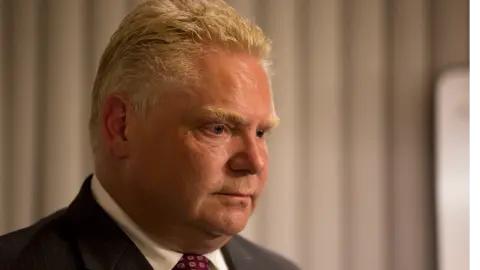 Getty Images
Getty ImagesA threat by US President-elect Donald Trump to tax imports from America’s three biggest trade partners has caused concern in one of the countries affected, Canada.
He has vowed to impose a 25% tariff on all goods from America’s northern neighbour – while also targeting Mexico and China. He described it as an attempt to tackle illegal migration and drug-smuggling to the US.
Doug Ford, the leader of Ontario province, was among those who criticised the move, which he described as “devastating”.
The official Canadian response has been more muted. CBC reported there had been a flurry of late-night calls between Prime Minister Justin Trudeau and Trump, and between the PM and province leaders.
“It was a good discussion and they will stay in touch,” a Canadian source said of the call between Trudeau-Trump call, as reported by Reuters.
In a public statement, Canadian ministers emphasised their work on the shared border – on which they said they placed the “highest priority”.
Deputy Prime Minister Chrystia Freeland and Public Safety Minister Dominic LeBlanc also used their statement to stress the importance of the US-Canada trading partnership, saying 60% of last year’s US crude oil imports originated in China.
Canada accounted for some US$437bn (£347bn) of American imports in 2022, and was the largest market for American exports in the same year, according to US data.
The 25% tariff on goods from Canada would be signed straight after he took office on 20 January 2025, Trump said on Monday.
He described the move as an effort to get the three other countries to toughen up on the illegal flow to the US of people and drugs, specifically fentanyl.
Ford, the leader of Canada’s most populous province, said the proposed tariff would be “devastating to workers and jobs in both Canada and the US”.
He called on the government to “take the situation at our border seriously”, and for Trudeau to “call an urgent meeting with all premiers”.
Ford was echoed by the leaders of Quebec and British Columbia, while a post on the X account of Alberta leader Daniella Smith acknowledged that Trump had “valid concerns related to illegal activities at our shared border”.
Other voices urged calm. “We’ve gamed out the possibilities that he lumps Canada and Mexico issues together, we’ve been there before,” said the head of Canada’s Automotive Parts Manufacturers’ Association (APMA) in a statement reported by CBC. “We are prepared and connected.”
Tariff hikes touted by Trump on the election trail could be a negotiating strategy, it has previously been suggested by the man picked by the US president-elect to be his new US Treasury secretary.
“My general view is that at the end of the day, he’s a free trader,” Scott Bessent said of Trump in an interview with the Financial Times before he was nominated for the role. “It’s escalate to de-escalate.”
What’s the issue at the US-Canada border?
Trump’s new border tsar Tom Homan has called the northern border an “extreme national security vulnerability”. He has alleged that Canada is being used as a path to enter the US by people from countries deemed to sponsor terrorism.
Illegal crossings from the US to Canada are vastly outnumbered by the number that take place from Mexico, another country targeted by Trump’s planned tariffs. But there appears to have been a surge.
Robert Garcia, a border official covering the US north-east, said last month that more than 19,000 people from 97 different countries had been arrested over the previous 12 months, which was more than “the last 17 fiscal years combined”.
Experts have told the BBC that America’s northern border is longer and less guarded than the southern one, with a similar presence of criminal smugglers.
One recent high-profile trial in the US shed light on smuggling operations that help foreign nationals move to North America unlawfully.
A jury in the US state of Minnesota found two men guilty of helping bring an Indian family from Canada to the US in January 2022, leading to their deaths.


North America correspondent Anthony Zurcher makes sense of the presidential election in his twice weekly US Election Unspun newsletter. Readers in the UK can sign up here. Those outside the UK can sign up here.


